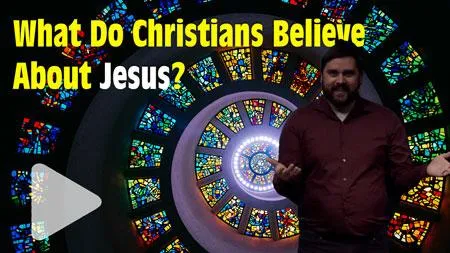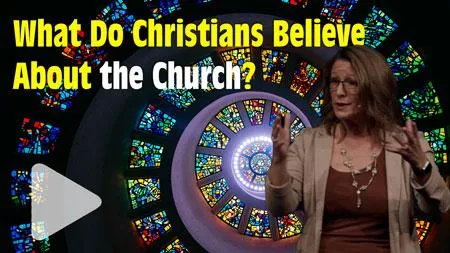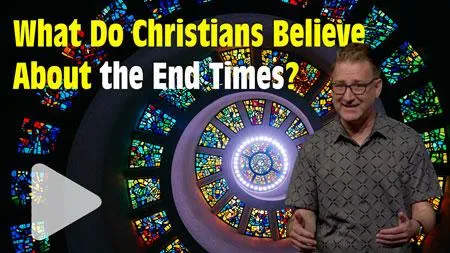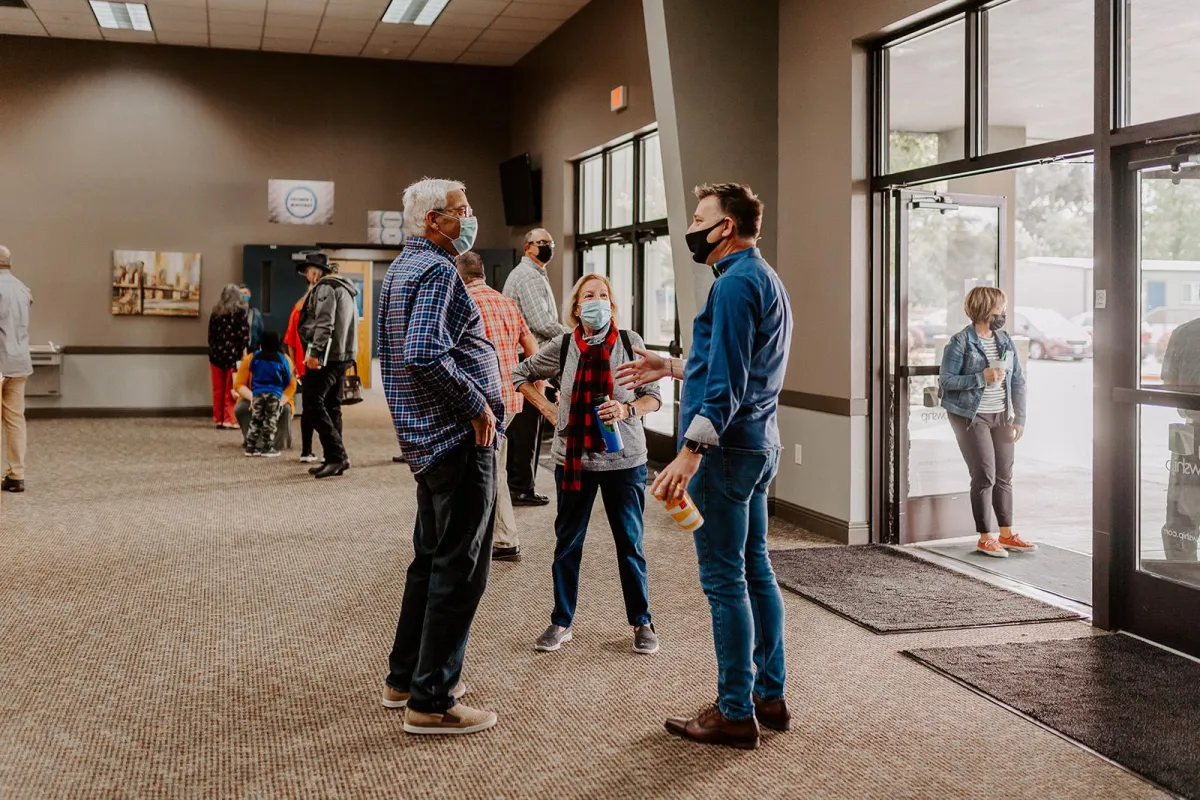what do Christians believe?

How Do You Recognize a Christian? is a study of the New Testament letters of 1st, 2nd, and 3rd John. In writing these three letters, John hoped to encourage the young churches scattered throughout Asia Minor to have an authentic, contagious walk with Christ; to rekindle their faith, love, and hope. His challenge to them -- live rightly and boldly in a world gone wrong -- is as relevant for us today as it was for his original readers. We know Jesus is the only real hope. Do we live like He is our only real hope? How will the world recognize real hope if they don’t see it in us?
What Do Christians Believe About the Bible? [Part 1]
Pastor Chris Voigt
April 11, 2021
What you believe matters. Everything we do, everything we think, and everything we say is shaped by what we believe to be true. The saying, “Actions speak louder than words” reflects the truth that how we live our lives says more about what we believe than the words we speak. So what do you believe? And how well does the life you live align with what you say you believe?
We’re beginning a new teaching series called What Do Christians Believe? Throughout this 8-week series, we will be taking a look at some of the foundational beliefs of our faith; the truths on which we build and live our lives. Perhaps you’re new to this Jesus stuff and don’t really know what Christians believe, or maybe you’ve been attending church for a long time but have never really dug into the specifics of what we believe and how it should impact your daily life. Or, it could be that you know what you believe, but you aren’t really sure how to explain it to someone else. No matter where you are in your faith journey, there is something for you in this series.
What Do Christians Believe About God? [Part 2]
Pastor Michelle Snook
April 18, 2021
What you believe about God is THE most important thing about you. Every decision you make, every word you speak, every action you take is deeply rooted to your core beliefs. Whether you are conscious of it or not.
This is the second of our 8-week series, What Do Christians Believe? In this message we’re talking about 5 things we believe about God. We are barely scratching the surface. But in order to know God, you have to start somewhere! Perhaps you aren’t sure whether or not you even believe in God. Maybe you’ve “known” Him all your life and have taken that knowing for granted. No matter where you are in your journey of knowing God, there will always be more to learn about Him.
What Do Christians Believe About Jesus? [Part 3]
Pastor Jon Sprouse
April 25, 2021
In 1952, C.S. Lewis published his classic work, Mere Christianity. It was an adaptation of a series of talks that Lewis had given on BBC radio between 1941 and 1944. England was deeply embroiled in the Second World War. It was a dark time in history. Lewis, a member of the English faculty at Oxford was invited to present a series of talks on BBC radio on the topic of Christianity. In the midst of dark and desperate days, Lewis’ words challenged listeners to evaluate what they believed, and offered truth and hope.
Speaking of Jesus, he said, “A man who was merely a man and said the sort of things Jesus said would not be a great moral teacher. He would either be a lunatic — on the level with the man who says he is a poached egg — or else he would be the Devil of Hell. You must make your choice. Either this man was, and is, the Son of God, or else a madman or something worse. You can shut him up for a fool, you can spit at him and kill him as a demon or you can fall at his feet and call him Lord and God, but let us not come with any patronizing nonsense about his being a great human teacher. He has not left that open to us. He did not intend to.”
What do you believe about Jesus? Have you examined His claims for yourself? Do you know why you believe the way you do?
This is message three in our series What Do Christians Believe? We are taking an 8-week look at the foundational beliefs of our faith, learning how to put into words what we know, and gaining a deeper understanding of how our lives should reflect the truths that we stand on. Whether you are just exploring faith, or have walked with Jesus most of your life, there is fresh truth for you as we study the Word of God together.
What Do Christians Believe About the Holy Spirit? [Part 4]
Pastor Chris Voigt
May 2, 2021
For most people, the concept of a father or father figure is one that is understandable, if not relatable. Whether your dad was amazing or absent, fantastic or dysfunctional, regardless of personal experience, we each have a frame of reference by which we understand what a father is. By the same token, we all get what it means to be a son or daughter or to have a son or daughter. The words ‘father’ and ‘son’ describe common familial relationships that we can relate to. When the words are used to describe God, our understanding of human relationships, for better or worse, gives us a starting place for understanding God the Father and God the Son.
But then there’s this third part or person we also know as God. We don’t seem to talk about Him as much. And maybe part of the reason is because we don’t know how to relate to Him? I mean…I have a dad -well, actually, I have three, but that’s a different story – and I am a dad. I can relate to the dad part of God. And I am a son, and I have a son, so I get that too. But, there’s no frame of reference for me when it comes to the person of The Holy Spirit. And I think it’s the same for a lot of us. Which has resulted in a serious neglect when it comes to understanding and knowing Him. Or even wanting to. As humans, we seem to want to avoid the unknown.
And yet, when Jesus was about to leave this planet and return to His Father in Heaven, He promised to send His followers something, or Someone, even better. Now, what could be better than Jesus? And if the Holy Spirit is the “better” that Jesus promised, why haven’t we been more intentional about getting to know Him?
We are in the midst of an 8-week teaching series called What Do Christians Believe? We’re taking a look at the foundational truths of our faith, the non-negotiables of what we build our life on. In this message, we’re going to dive in to what the Bible has to tell us about the Holy Spirit; to learn more about who He is, and His role in our lives.
What Do Christians Believe About People? [Part 5]
Kap Otten
May 9, 2021
It’s the one question every human being wants an answer to. Maybe you’re asking it right now. It doesn’t matter what gender you are, what color your skin is, what neighborhood you live in, or how much money you make. It makes no difference if you’re a sports fan or a music lover, a stay-at-home parent or a CEO, an early bird or a night owl, on team Diet Pepsi or the winning team, Diet Coke.
Sooner or later, we all want to know…Why am I here?
Where you find the answer to that question will determine the direction of your life. Are you looking to another person for your answer? Or maybe a career? Perhaps it’s a passion for a particular issue that motivates you. The trouble with those sources of meaning is that they are temporary and changeable. There’s a deeper answer to the question. One that’s rooted in the unchanging character of the God who created you with intention and purpose. That’s the answer we really want.
In this message in our series What Do Christians Believe? we’re taking a look at what the Bible says about people. A foundational question about our purpose requires foundational truth for us to build our lives on. Join us as we see what God’s Word has to say about who we are and how the answer to that question could radically change your life.
What Do Christians Believe About Salvation? [Part 6]
Pastor Chris Voigt
May 16, 2021
There’s more than one option in almost every area of life. There are hundreds of choices of breakfast cereal, or types and styles of shoes, or music to listen to, or books to read. There’s more than one way to do laundry, to shop, or to exercise. We live in a highly individualized society where we cherish the ability to choose what works for ME.
Many people believe that there are multiple ways to have a relationship with God. But what does the Bible have to say about that?
In this message in our series What Do Christians Believe? we’re talking about what it means to be “saved.” What is salvation? How do we get it? And if I need it, how do I get it? Is there only one way to be saved or do I have options? Join us as we see what God’s Word has to say about what it means to be saved and have a relationship with God.
What Do Christians Believe About the Church? [Part 7]
Pastor Michelle Snook
May 23, 2021
Those people who gather data and statistics on cultural trends would say that in America, one of the things that has disappeared from the rhythm of our lives as a nation is the connection to and involvement with Church. A recent Gallup study reports that for the first time in their 8 decades of doing research, the percentage of Americans who say they belong to a church is less than 50%. Why have so many who grew up in church, decided to walk away?
In this message in our series What Do Christians Believe? we’re talking about the Church. What is THE Church? What is its purpose? And why should it matter to you? We’ll be unpacking 5 core truths about the Church and considering how those truths could change your life.
What Do Christians Believe About the End Times? [Part 8]
Pastor Chris Voigt
May 30, 2021
If you google “end times news” your search will come back with an astonishing and overwhelming 1 billion 850 million results. It seems that people everywhere, of every faith or no faith at all, are at some level, intrigued with the unknown and interested in what “the end” will look like. Countless people have dedicated their careers, if not their lives, to predicting the return of Jesus and the ensuing chaos and calamity that will result in the end of life on earth as we know it.
Author and journalist Dina Niyeri writes, “For believers, “the end” has always been imminent. In the Christian world, every century seems to bring a new wave of calculations. On January 1, in the year 1000, Pope Sylvester II predicted a millennial apocalypse. Two centuries later, Pope Innocent III predicted that the end would arrive 666 years after the birth of Islam. The Black Death brought rapture fever, as did every comet. Cotton Mather, the influential American preacher, had three guesses between 1697 and 1736. As for this century, a 2010 Pew Research Center study found that nearly half of American Christians – not just evangelicals – believe Christ will return in their lifetime.”
What is this fascination with the end times all about? What is it that drives our desire to know what’s coming? And what do we as followers of Jesus really believe about the end times?
We’re wrapping up our sermon series What Do Christians Believe in this message. And we’ll be taking a look at what God’s Word has to teach us about the end times. There is much that we can know for sure; truths that give us firm ground to stand on, even as we navigate increasingly challenging and uncertain times.
get connected
receive updates and helpful content from dayspring!


Services




















